Friday 28 September 2012. Somewhere near Tha Vian, Xiangkhouang, Laos
Cycling is as glorious as the day is long. Though not for long beyond that. When the day fades and night creeps in and you’re still pedalling up a hill, not really sure where you are or where you’re going, the magic does tend to drain out of it.
“Are you sure we’re even on that trail?”
“I’m pretty sure, look, you can see the hill we’re on, and we followed that track there—that’s probably that line.”
“Or that one.”
It was evening on our second day down the backroads and Olivia and I should have reached the top of this hill half an hour ago. We hadn’t, I’ve discovered since researching this piece, because I don't think we were where I thought we were. This goes a long way to explaining why our hill went on for much longer than it was supposed to, and why we were left wearily labouring the pedals as the sky ripened into dusk.
We’d set off that morning in a buoyant mood, rolling over lonely low hills and down through the dappled light of bosky river valleys. The road was much quieter than the day before; the villages and food shacks sparser. Half hours would tick by to nothing but the mutter of our pedals and the distant lowing of livestock. Now we were out here and making good progress, it seemed so blindingly obvious that taking the risk and venturing off the highway was the way to do it, and yet making that choice was never easy. Every time we ventured down some narrow track we rolled the dice and could easily find ourselves down on one of the essentials.
“Remember Prigi.” we’d always remind ourselves.
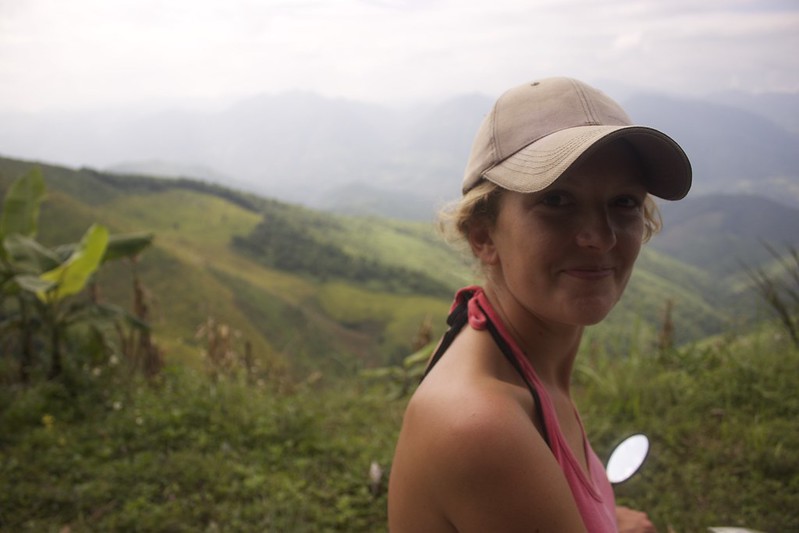 Prigi was a fishing town in southern Java and had been an early lesson in our adventuring. We’d set off out of town one morning down a little stone track that we assumed would quickly join up with the main road. It didn’t. The trail was exposed, it was baking hot and we ended up getting lost and running out of water. We had to resort to raiding coconuts from trees and hacking at them with a rock for twenty minutes for the sake of a few mouthfuls of shell-splintered milk. In the end it took us three days to get back to the main road. And while we regale the story with a fondness now, pushing our bikes up that track in the equatorial heat with just a few hot dregs of water left in our bottles was not something we ever fancied repeating.
Prigi was a fishing town in southern Java and had been an early lesson in our adventuring. We’d set off out of town one morning down a little stone track that we assumed would quickly join up with the main road. It didn’t. The trail was exposed, it was baking hot and we ended up getting lost and running out of water. We had to resort to raiding coconuts from trees and hacking at them with a rock for twenty minutes for the sake of a few mouthfuls of shell-splintered milk. In the end it took us three days to get back to the main road. And while we regale the story with a fondness now, pushing our bikes up that track in the equatorial heat with just a few hot dregs of water left in our bottles was not something we ever fancied repeating.
Back in Laos, the day rolled on. By the early afternoon our road had shrivelled to a white stone track surrounded by meadows and turtleback hills. This should have been idyllic riding, but the stones were causing havoc with my worn old tyres. The rubber was now so thin that it only took a bump and a pointy stone to breach the inner tube. The first puncture shot the air right out of the back wheel. Then, within the hour, it returned to smuggle it back out again as we sat eating lunch.
We were expecting the rest of the day to be tough as our route now wound up into the hills for twenty kilometres before descending to the town of Muang Khoum—or at least it would have done, if my map reading had been up to scratch. I was convinced there would be a place to stay once we reached this town and I was adamant that we could make it before dark—a point I maintained even when we got up to leave and found the base of my tyre spreading flat into the ground.
We fixed the puncture and bit in to the ascent, relieved at least to find the road newly paved and the worst of the day’s heat behind us. We climbed up what felt like endless concertina hairpins as the sun dipped west and the cool air of the evening rose to bristle our skin.
Four hours passed—twenty kilometres—but still the road went up. On and on as the light withdrew, stretching our hunched shadows up against the dirt. Every time we rounded a corner we prayed that there we’d see the road curving downwards—it must be one of these corners—but there was nothing, just more road winding up.
Just as the light turned grainy and the sun pinched away behind the hills, we rounded a corner to find a hushed, palm-thatched village in the shadow of the hills. Any immediate hope of finding accommodation was quickly checked as we rode past the dark and silent houses, peering around for any sign of activity. A single light shone up ahead, emanating from a little wooden shop-shack at a bend in the road. We dismounted and asked the shopkeeper in our caveman Lao if there was somewhere we could stay or pitch a tent, but he didn’t seem to understand, grew agitated and walked off, leaving us there, not sure what to do, as a few shy, silent people emerged and gathered around us.
Night was nearly on us now. We had to find out if we could camp here, and if not then we needed to get moving. The risk from unexploded ordnance made wild camping unthinkable, so we’d just have to keep riding until we found another village or reached Muang Khoum. It was a grim prospect. We’d been riding for almost twelve hours now, we were exhausted, soaked in sweat and the air was growing cold.
Just then we were helloed in English, and we turned to see the shopkeeper returning from across the road with a merry old man on his arm. The old man spoke a slow, gentle English and seemed pleased at the opportunity to practise. I’m afraid we were just eager to clarify the situation and we rushed the pleasantries: was there anywhere in the village that we could stay?
‘Yes.’ he beamed, gesturing into the shop ‘You can stay right here!’
This spontaneous hospitality was not uncommon on our trip, but we still couldn’t help marvelling at the family’s generosity as we sat with them that evening around two large bowls of sticky rice and barbecued meat. They were too poor to afford a table, but generous enough to invite us into their house, give up a bed and have us to join them for dinner. The next morning we offered the shopkeeper some money to cover our costs, but he was aghast at the suggestion. We had needed help and he was clear, despite the language barrier, that we were his guests, his friends, and he was only doing what anybody else would do in that situation. I wonder how true that is.
It was frustrating not being able to fully express our gratitude to the family that night. We had the grandfather translate for us a few times, and the rest of the time we patted our bellies and beamed at the meal, chopped up our phrases to botch together new ways of thanking them, and Olivia helped the children out with their English homework, though in the end I think our appreciation was most apparent in our appetites. All those hours up the hill had worked up a thumping hunger and we wolfed down heaped forkfuls of rice and set eagerly at the bowl of treacle-dark meat.
It was as I was gnawing at a plum-sized portion of the meat that I realised something wasn't quite right. This little chunk was actually half a ribcage. Now, this was about the right size for a very small chicken, but this was definitely not poultry meat. It was mammal meat, and from a mammal that couldn’t have been any larger than a ferret.
‘Very good food.’ I told the grandfather, ‘Erm. What is it?’
Liv, now alerted, was warily eyeing the proportions.
‘Ha. Ahh.’ he struggled ‘I no... in English. Sorry.’
‘OK.’
‘It’s very good.’ Liv corrected, and we got back to eating, though perhaps a little less enthusiastically than before.
It wasn’t until the next morning, after we’d confirmed with the shopkeeper that this road would eventually reach Muang Khoum and we'd hit the top of this hill in a few miles; after we’d been inspected by a crowd of giggling children and introduced to their pet, a large blue-furred rodent, like a giant hamster crossed with a gopher; it wasn’t until we’d said our goodbyes and shaken hands with everybody and made it some way up the hill that I realised what it was we had eaten.
‘I think we ate one of those giant hamster things last night.’
‘One of those? Oh. Shit.’
Hoary bamboo rats, they’re called. We saw a row of them being barbecued by the road a few days later, and later learnt they make up a chunk of the protein intake out here. And, in many ways, we really hope it was a hoary bamboo rat. Because otherwise, what the hell were we eating?
* * * * *



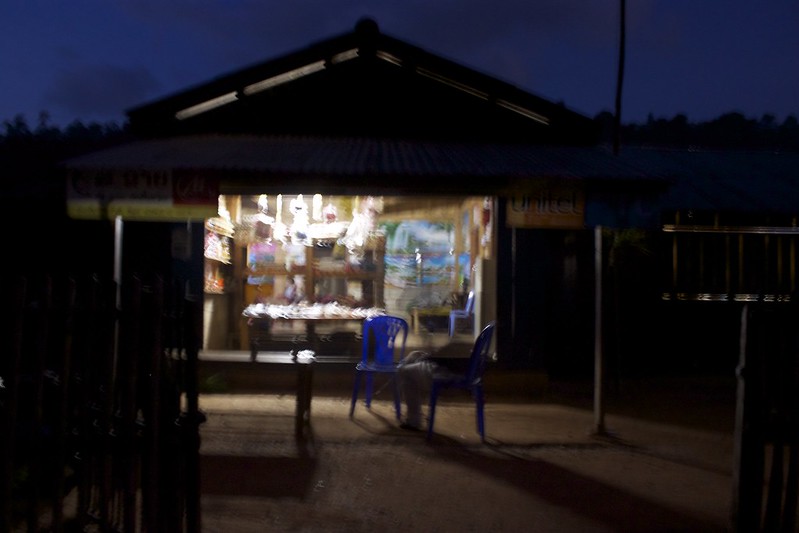

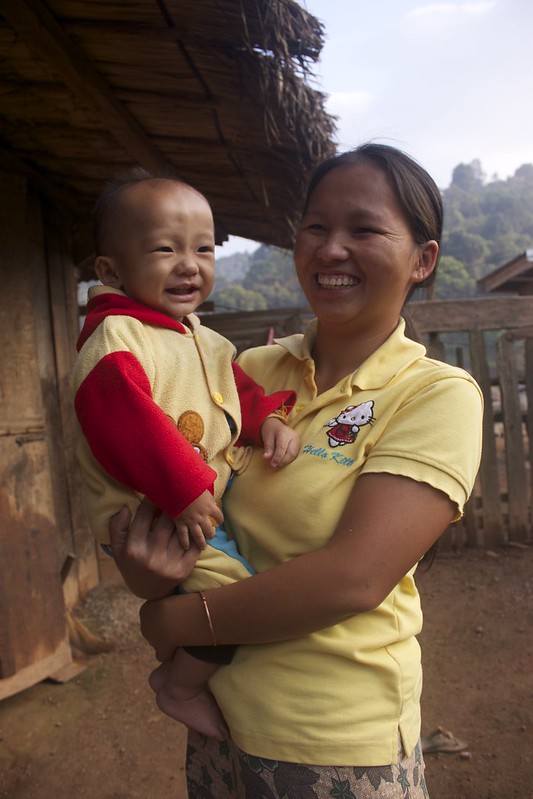


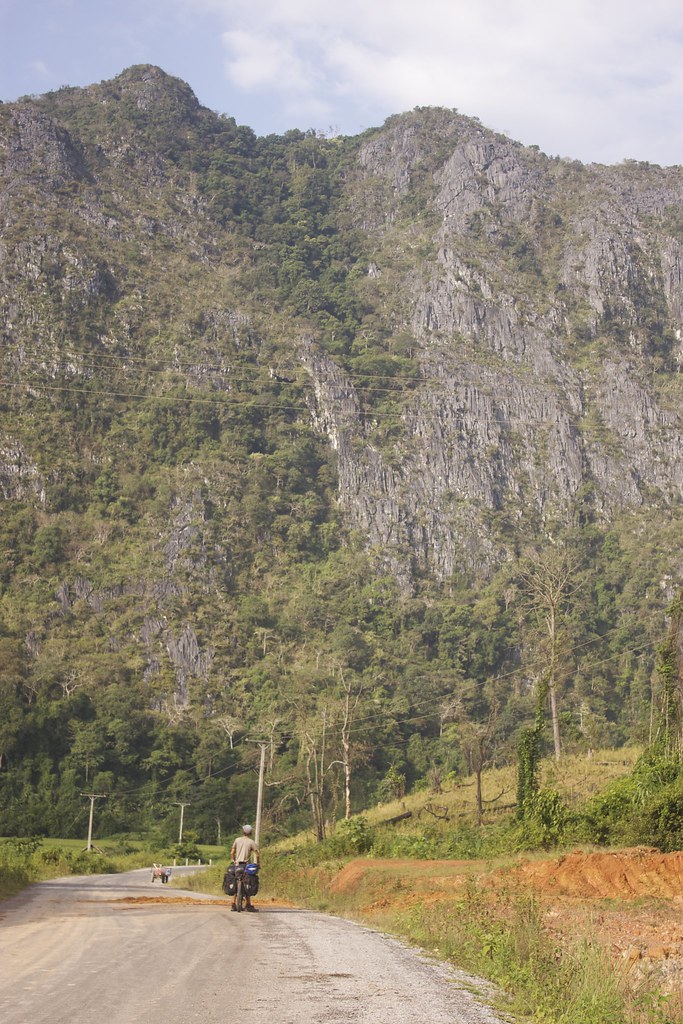

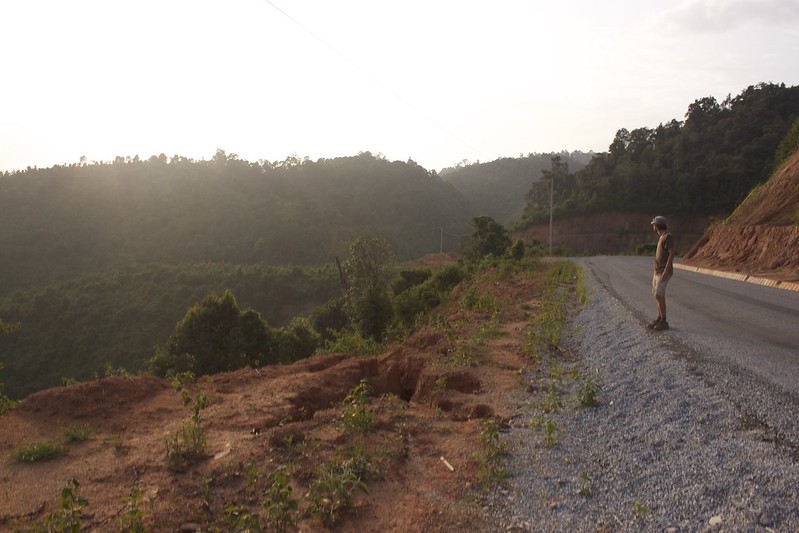

Fantastic Robin. Very moving how generous people are, and you wish this was world-wide, and that in certain places there is such a distrust of foreigners. I hope one day these lovely kind people actually get to see your blog and the pictures. Maybe someone someday may cycle the same route and actually be able to show them.
ReplyDelete